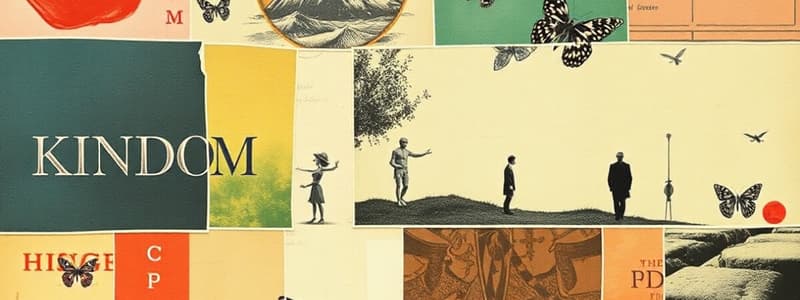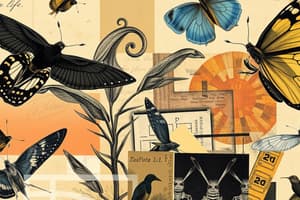Podcast
Questions and Answers
Which of the following kingdoms includes single-celled organisms with a nucleus?
Which of the following kingdoms includes single-celled organisms with a nucleus?
- Protista (correct)
- Fungi
- Animalia
- Monera
Which of the following statements about mitosis and meiosis is correct?
Which of the following statements about mitosis and meiosis is correct?
- Mitosis and meiosis both produce identical cells.
- Mitosis results in variation among cells.
- Mitosis results in identical cells. (correct)
- Meiosis creates identical cells.
All plants are classified under the Animalia kingdom.
All plants are classified under the Animalia kingdom.
False (B)
The X and Y chromosomes determine a person's blood type.
The X and Y chromosomes determine a person's blood type.
What is the primary function of meiosis?
What is the primary function of meiosis?
What is the universal donor blood type?
What is the universal donor blood type?
The classification of animals with jointed legs is called ______.
The classification of animals with jointed legs is called ______.
The _____ of Dominance states that one trait masks the other trait.
The _____ of Dominance states that one trait masks the other trait.
Match the following types of plants with their classifications:
Match the following types of plants with their classifications:
What is the outcome of mitosis?
What is the outcome of mitosis?
Match the following parts of the blood to their roles:
Match the following parts of the blood to their roles:
Honey bees only serve the purpose of honey production.
Honey bees only serve the purpose of honey production.
What is a primary benefit of cross-breeding in agriculture?
What is a primary benefit of cross-breeding in agriculture?
Name one type of organism found in the Fungi kingdom.
Name one type of organism found in the Fungi kingdom.
Artificial insemination involves the fertilization of eggs outside the body.
Artificial insemination involves the fertilization of eggs outside the body.
Name one example of an endangered species in Nepal.
Name one example of an endangered species in Nepal.
The phase where duplicated chromosomes align in the middle of the cell during mitosis is called ______.
The phase where duplicated chromosomes align in the middle of the cell during mitosis is called ______.
The normal blood pressure is _____ mmHg.
The normal blood pressure is _____ mmHg.
Which of the following is an example of a mammal?
Which of the following is an example of a mammal?
Which method uses advanced tools like CRISPR for genetic manipulation?
Which method uses advanced tools like CRISPR for genetic manipulation?
Flashcards
What are Monera?
What are Monera?
Single-celled organisms without a nucleus. Examples include bacteria.
What are Protista?
What are Protista?
These organisms are single-celled and have a nucleus, like amoebas and paramecia.
What are Fungi?
What are Fungi?
Fungi are decomposers with cell walls made of chitin. Think mushrooms and yeast.
What are Plantae?
What are Plantae?
Signup and view all the flashcards
What are Animalia?
What are Animalia?
Signup and view all the flashcards
What are Bryophytes?
What are Bryophytes?
Signup and view all the flashcards
What are Pteridophytes?
What are Pteridophytes?
Signup and view all the flashcards
What are Gymnosperms?
What are Gymnosperms?
Signup and view all the flashcards
What are Angiosperms?
What are Angiosperms?
Signup and view all the flashcards
What is Mitosis?
What is Mitosis?
Signup and view all the flashcards
Mitosis vs. Meiosis
Mitosis vs. Meiosis
Signup and view all the flashcards
DNA vs. RNA
DNA vs. RNA
Signup and view all the flashcards
What are chromosomes?
What are chromosomes?
Signup and view all the flashcards
What are sex chromosomes?
What are sex chromosomes?
Signup and view all the flashcards
Mendel's Law of Dominance
Mendel's Law of Dominance
Signup and view all the flashcards
Mendel's Law of Segregation
Mendel's Law of Segregation
Signup and view all the flashcards
What is a mono-hybrid cross?
What is a mono-hybrid cross?
Signup and view all the flashcards
Dominant vs. Recessive Traits
Dominant vs. Recessive Traits
Signup and view all the flashcards
Applications of DNA Testing
Applications of DNA Testing
Signup and view all the flashcards
Traditional vs. Advanced Seed Selection
Traditional vs. Advanced Seed Selection
Signup and view all the flashcards
Study Notes
Classification of Living Beings
- Five-Kingdom Classification: Monera (single-celled, no nucleus, e.g., bacteria), Protista (single-celled, with nucleus, e.g., amoeba), Fungi (decompose, chitin cell walls, e.g., mushrooms), Plantae (photosynthesis, e.g., trees), Animalia (depend on other organisms, e.g., humans).
- Plantae Kingdom: Bryophyta (non-vascular, e.g., mosses), Pteridophyta (vascular, no seeds, e.g., ferns), Gymnosperms (seeds, uncovered, e.g., pine trees), Angiosperms (seeds inside fruit, e.g., roses).
- Animalia Kingdom: Porifera (simple pores, e.g., sponges), Cnidaria (stinging cells, e.g., jellyfish), Arthropoda (jointed legs, e.g., insects), Vertebrata (backbone): Pisces (fish), Amphibia (land & water, e.g., frogs), Reptilia (cold-blooded, scales, e.g., snakes), Aves (feathers, beaks, e.g., eagles), Mammalia (fur, mammary glands, e.g., humans).
- Classification and Evolution: Organisms grouped by shared traits that reveal evolutionary relationships from common ancestors.
Life Cycle and Cell Division
- Honey Bee Life Cycle: Egg → Larva (fed) → Pupa (develops) → Adult (queen, worker, drone). Uses: Pollination, honey, ecosystem balance.
- Cell Division: Mitosis (identical cells, growth, repair, asexual reproduction, phases: prophase, metaphase, anaphase, telophase, cytokinesis), Meiosis (unique cells, reproduction, genetic diversity, two divisions).
- Mitosis vs. Meiosis: Mitosis = 1 division, identical cells; Meiosis = 2 divisions, unique cells.
- Chromosomes: DNA (genetic info, double-stranded), RNA (helps make proteins, single-stranded), Chromosomes (thread-like DNA carriers), Sex Chromosomes (X & Y determine sex).
Heredity
- Mendel's Laws: Dominance (one trait masks another), Segregation (genes separate), Monohybrid Crosses (one trait, F1-all dominant, F2-3:1 ratio).
- Dominant & Recessive Traits: Dominant (appears, e.g., tall), Recessive (hidden, unless paired, e.g., short).
Genetic Technology
- DNA Testing: Identifying people, finding conditions, solving crimes, CRISPR (gene editing), AI.
- Seed Selection: Traditional (hand-picking), Advanced (hybrids, GMO-better crops).
- Cross-Breeding: Stronger crops, pest resistance, but can reduce biodiversity.
- Artificial Insemination: Sperm to female, IVF (egg fertilization outside body).
Human Blood Circulatory System
- Blood: Plasma, red/white blood cells, platelets. Role: Carries oxygen, fights infection, clotting.
- Heart: Four chambers (2 atria, 2 ventricles), valves (one-way blood flow).
- Blood Vessels: Arteries (oxygen-rich), Veins (oxygen-poor), Capillaries (gas/nutrient exchange).
- Blood Circulation: Pulmonary (heart-lungs), Systemic (heart-body).
- Blood Groups: A, B, AB, O. Universal donor (O), Universal recipient (AB).
- Blood Pressure: Normal is 120/80 mmHg, Uric Acid: Too much can cause gout, manage with diet.
Nature and Environment
- Climate Change: Causes (greenhouse gases, deforestation, factories), Effects (higher temps, extreme weather), Solutions (trees, renewable energy, emissions reduction).
- Endangered Species in Nepal: Red panda, snow leopard, one-horned rhino. Protection: Preserve habitat, stop poaching.
- Herbal Medicines: Holy basil (colds), aloe vera (burns), neem (antibacterial), use: safe, eco-friendly remedies.
Studying That Suits You
Use AI to generate personalized quizzes and flashcards to suit your learning preferences.




